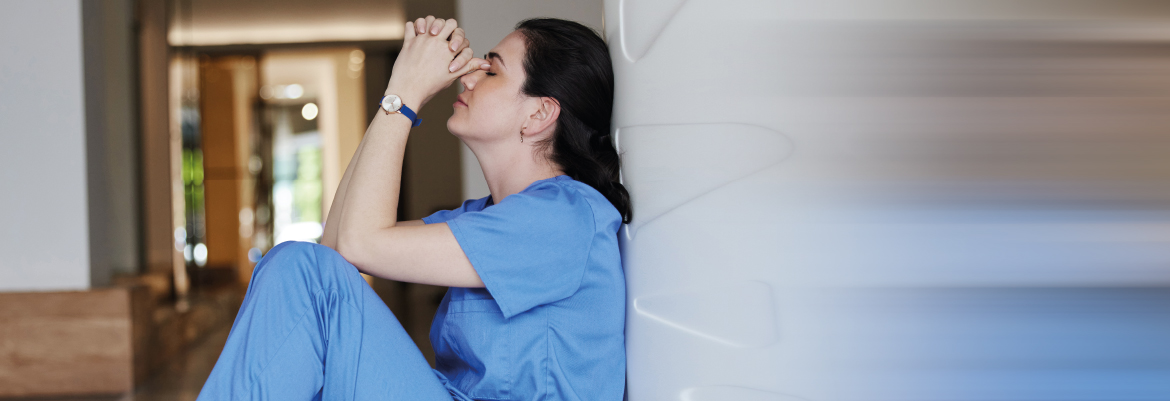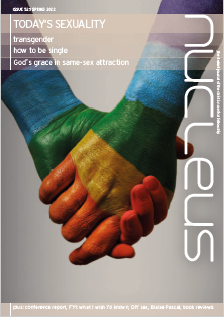'How was your day?' has become an increasingly difficult question to answer. Nowadays, it takes quite a bit of time to filter out everything that could either: a) break patient confidentiality, b) completely disgust whoever it is I'm talking to, or c) cause me to break down in tears.
My name is Sally and I'm a new FY1, working in London. I came to Christ in the early years of medical school and my student days were a blur of CMF events, church, and a fair few late nights of everything else. I loved the Lord and loved the life he had provided for me — my faith felt rock-solid.
And then I graduated.
Essentially, FY1 can be hard, and I wasn't prepared for it. Sure, I knew my A-E, and could make a fairly accurate stab for a vein. I knew eye contact was important and that you should always refer to a senior. I even thought I knew how to take a spiritual history, witness to patients and colleagues alike, all whilst maintaining some daily silence and solitude.
What I hadn't anticipated was how the challenges of the FY1 lifestyle — the rota, the responsibility, the sleep deprivation, the workplace politics — could impact my faith. As I come to the end of my first year as a doctor, I'd love to share with you five things I'd wish I'd known before it all began.
1. there is always time for quiet time
John 15:5 says 'I am the vine; you are the branches. If you remain in me and I in you, you will bear much fruit; apart from me you can do nothing.'
Psalm 27:1 says 'The Lord is my light and my salvation — whom shall I fear? The Lord is the stronghold of my life — of whom shall I be afraid?'
Whatever your daily 'quiet time' looks like now, it will probably need to adapt to a variable working week. As a student, routine involved a period of silence and solitude in the mornings before breakfast. However, a new commute, coupled with eight am ward rounds, made it increasingly hard to wake up early enough to fit it in. I remember once, only a few weeks in, I had missed my morning quiet time but accidentally arrived 20 minutes early for work. I had my Bible in bag and so I settled myself in the staff kitchenette and started reading Psalm 27 (above). At exactly the same time, a very formidable consultant strode onto the ward and started conducting a post-take ward round. I was petrified of this consultant noticing me at all, let alone him noticing what I was reading — until I clocked the very first verse of the Psalm.
Over the year, I've tried setting aside time in the evening instead, or simply heading to work earlier and reading my Bible in the hospital coffee shop (which thankfully opens at 7.30 am!). For night shifts, I found the multifaith rooms at my hospital were open 24/7, and end-of-shift prayers in the car became a new but incredibly meaningful practice. Time with God, and God alone may feel much harder to find, but is vital for sustaining us (and giving us courage) for all we may face throughout the day.
2. the hospital is a mission field
Acts 16:25 says 'About midnight Paul and Silas were praying and singing hymns to God, and the other prisoners were listening to them.'
When I was at medical school, I received some brilliant training in evangelism from CMF and CU. We held events specifically to evangelise: 'Text a Toastie', 'Cookie for a Question' and so on. Whilst such events are currently lacking in the Foundation Programme calendar, there are still so many wonderful and unexpected opportunities to share the gospel whilst working as an FY1. It might be simply wearing a cross necklace or referencing church when you discuss your weekend plans with colleagues. It could be the fact that you always take a spiritual history when clerking (as advised by GMC guidelines!) [1] or always ensure chaplaincy is offered to those with a documented religious belief. It could be what's in your bag. I once left my bag unzipped accidentally in a ward staffroom, only to be instantly quizzed by two members of the nursing staff as to where I'd got my 'gorgeous Bible' from. Picture Paul and Silas in prison, not flyering, not preaching, not even praying, but simply worshipping. Witnessing to our identities in Christ may look different in different seasons but it's something we can all keep doing, no matter what the circumstances!
3. it's okay to need reminding who you are
Colossians 3:1-3 says 'Since, then, you have been raised with Christ, set your hearts on things above, where Christ is, seated at the right hand of God. Set your minds on things above, not on earthly things. For you died, and your life is now hidden with Christ in God.'
That being said, a long shift of medical emergencies can erode that knowledge of our true identity. You know it's not a good sign when you start answering the phone as 'bleep 221' instead of your name!
One piece of advice that was shared at the CMF FY1 Q&A last year was: make the best use of your passwords. When you start FY1, you will need to make at least five new passwords for various computer systems. What if each of these was a Bible verse? Throughout your day, every time you log on this could be a reminder of who God is and who he knows you to be. It may sound trite, but I've found it so helpful to have this almost hourly reminder to re-orientate myself to whom I truly serve.
4. you're not alone
Romans 1: 11-12 says 'I long to see you so that I may impart to you some spiritual gift to make you strong — that is, that you and I may be mutually encouraged by each other's faith.'
I hope this one is obvious! No matter where you are for FY1, no matter what tiny district general or sprawling tertiary centre you've been placed in, you are not alone. Try and find time to call friends regularly, even if it's hard to see each other in person. Church is always worthwhile, no matter how long you're in the area for. Meanwhile, your CMF family is global and lifelong. For example, the CMF website can be used to link up with CMF members in your area. They may be new FY1s like you, seeking community. Or they may be more senior healthcare professionals who can guide, pray and support you on the journey. Most importantly, there's always CMF Juniors' Conference coming up in November (and yes, there's still a ceilidh)!
5. invest in decent bedding
A material necessity, secondary only to the Bible. Enough said.
Colossians 3:17 says: 'And whatever you do, whether in word or deed, do it all in the name of the Lord Jesus, giving thanks to God the Father through him.'
As a healthcare professional, 'how was your day?' will never be an easy question. Nor should it be — we have been called to stand in the gap between life and death. To find it easy, to find it simple, is demeaning and dehumanising to those we serve.
In some ways, I think it's better to focus on the question: 'how was your life?' For this is the question we will truly need to answer at the very end. No matter how difficult each day can be, let us run the race with our eyes fixed on Jesus, reflecting his love, joy and mercy as we go.
































